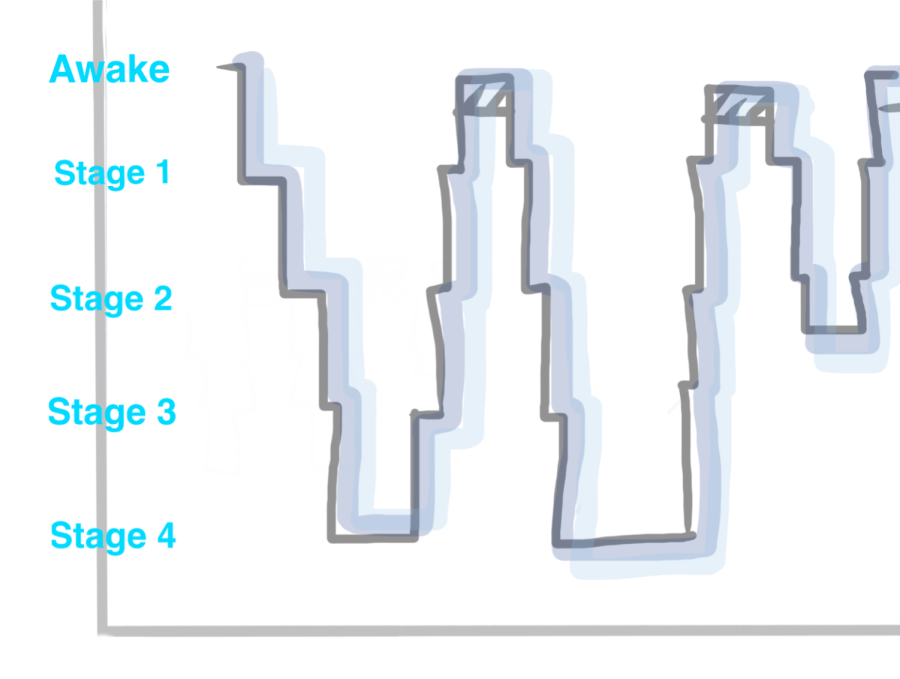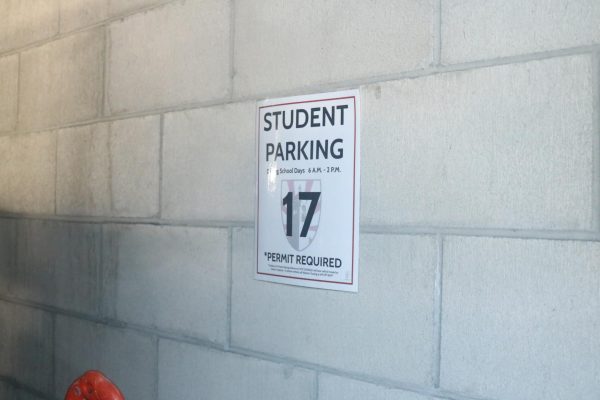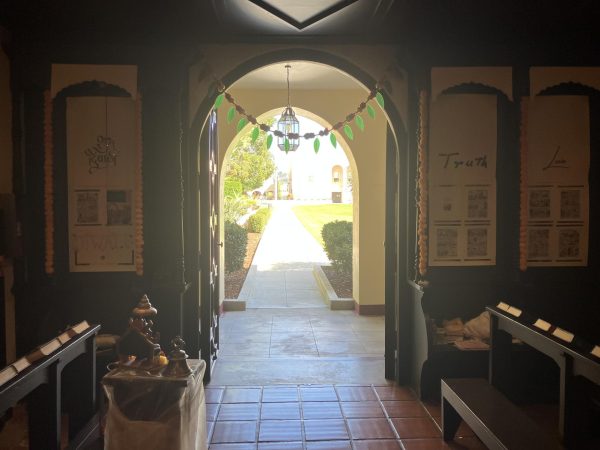Powering Down For The Night
Screen Time before bedtime can harm your sleep
This diagram, originally drawn by Chair of History and Social Sciences Ms. Karri Woods, explains non-rapid eye movement (REM) and REM sleep. In REM sleep, “a person’s brain activity, breathing, heart rate, and blood pressure increase, and the eyes move rapidly while closed” according to the National Cancer Institute. After about 90 minutes, you will hit REM sleep, and as the night goes on, the length of REM sleep gets longer over time.
“I will die on this hill, I will fight this battle till the end, I will scream from the rooftops till I am old and gray,” asserted History and Psychology teacher Ms. Emily Smith, a staunch opponent of technology use before bedtime. Ms. Smith said that she would personally “buy a two-dollar alarm clock at the dollar store” for any student so that we can keep our phones away at night.
Whether you’re watching YouTube or scrolling through Instagram, using technology before bedtime can harm your mental and physical health because the blue light affects melatonin production, damages physical health, and can exacerbate mental health issues.
95 percent of Americans say that they use some type of technology in the hours leading up to sleep according to Sleep Foundation, one of the largest research organizations for sleep. “Your brain is on all day, especially Bishop’s students,” said Ms. Smith. “You are working and working, sports, extracurriculars, and then scrolling at night is easy and mindless.” She followed up and explained, “Kids do that right before bed because it’s an unintended reward. Kids think it’s a way to calm down, but what it actually does is overstimulate you.”
In an article published by Health Essentials from Cleveland Clinic, sleep medicine expert Dr. Michelle Drerup said, “Checking your phone stimulates your brain. You’re more active and awake. Even just a quick check can engage your brain and delay sleep.”
Our brain gets overstimulated by the mere usage of technology, which causes us to find it harder to fall asleep. Chair of History and Social Sciences Ms. Karri Woods said, “Our brain doesn’t shut off when we are asleep. It is actively running processes that are designed to enhance our physical health, dispose of toxins, and consolidate memories.” She also said, “Scrolling through your phone and playing video games late at night has a stimulating effect that may delay the onset of sleep.”
Through Ms. Woods’ teacher-student interactions, she said that her students say that they Facetime their friends before bed, and “it is a window of time where adolescents can still be social without having to be in the same physical space.”
From a student’s perspective, Jackson Weiseer (‘26) said, “It is the temptation, it is part of my schedule.” He added, “I am aware and that’s why I try to avoid it, but at this point, I feel like… it is part of my routine.” Furthermore, he also said that not only is it addictive to look at his phone but it is so easy to do it while he is lying in bed. In the end, Jackson usually uses his phone before bed to check his schedule for the next day, make sure all his assignments are done, and read ebooks but avoids social media.
In addition, Thomas Yerbury (‘25) said, “I enjoy the peace and quiet and like catching up with what’s going on online.” He also said, “This is when I usually find time to sit down and relax after I’ve finished all of my schoolwork and after-school activities.”
For some, technology before bed can be a coping method for already existing feelings of depression or stress. Director of Counseling Ms. Megan Broderick (‘98) said that technology is “a distractor and a great way to procrastinate. Things that cause us anxiety we are compelled to avoid, and that avoidance fuels anxiety.”
Focusing on the social media aspect of technology, Director of Teaching & Learning Ms. Stephanie Ramos said, “Social Media is a fake version of the world… [When you compare yourself after] seeing someone who gets all A’s … means you are not soothed so you need to self-soothe some other way so it is a vicious cycle.” Ms. Ramos continued saying, “Even in bed at night you are probably thinking about things you need to do tomorrow. Soothing yourself with a TV show or a video is a way to calm your body down to try and sleep. But with blue light, it is not helpful.”
Technology use before bed damages people’s brain health. The blue light that comes from many devices disrupts our body’s production of melatonin and our circadian rhythm. Melatonin plays a key role in our body’s sleep-wake cycle. Its production increases with the darkness of night and helps orient our body’s circadian rhythm. The circadian rhythm helps ensure that our body’s processes are optimized at different stages throughout a 24-hour period. These circadian rhythms connect and harmonize with our mental and physical systems. Ms. Ramos explained that because of technology’s blue light, “Now your body is not producing melatonin to go to sleep and stay asleep.”
In an article published by the Australian Broadcasting Corporation, South Australian sleep researcher Dr. Sarah Blunden said, “Sleep is the foundation of all physical and mental health essentially. That sounds very radical but it’s true.” In general, a lack of sleep which technology can cause increases the risk of diabetes and heart disease among other illnesses according to Somnology, a digital healthcare company.
Technology affects people physically because getting enough sleep is vital for the body to function. Ms. Smith said, “[The] effects of being underslept in the short run is that people are less functional and more emotional and they are at higher risk of depression and anxiety. In the long term, if you are under-slept, it is linked to dementia and Alzheimer’s.” According to School Nurse Ms. Susie Fournier, more effects include obesity, risk-taking behaviors, increased rates of suicide, alcohol and drug use, poor academics, and poor school performance.
From a nurse’s perspective, Ms. Fournier said, “The physical impact is sleepiness which decreases academic performance and makes it harder for you to cope with things and can cause you to withdraw and become more emotionally reactive.”
On one hand, Thomas said, “I understand tech before bed is bad, but it hasn’t seemed to have a negative effect. I still get enough sleep to function the next day.” On the other hand, Jackson said that technology before bed makes it harder for him to go to sleep.
Solutions and alternative ideas are dimming the screen on devices, restricting technology use, and putting one’s phone on ‘do not disturb’ to make sure that no notification can disrupt your sleep schedule.
Many faculty members brought up numerous solutions such as “doing online homework before written homework to relax the eyes prior to going to sleep,” said Ms. Ramos. Nurse Fournier, who has teenagers herself, said, “I tell them[her children] if they are not tired, to read a book and I find them asleep 10 minutes later.” Ms. Broderick offered, “Parents can set boundaries… do meditation, listen to calm music. Don’t charge your phone in your bedroom even next to your bed. Get a regular alarm clock.”
Students also use a variety of strategies to help them ease into sleep. One student who uses his phone to play music was Giacomo Berti (‘24). Giacomo said, “I think it helps me relax a bit, gives me some time to think, and I try to put on relaxing music so I can ease into sleep.” Jackson also said, “Once in a while I try to leave my phone and other electronics outside of my room.” However, he said, “This schedule kind of falls off when I need it one night for music or to read, then it stays in my room and the schedule is broken.” Additionally, Thomas, who leaves his phone outside his room to remove the distraction, said, “I usually try to take my eyes off my phone screen and try to watch TV which seems to be less harsh on my eyes before bed.”
Ms. Woods tells her students: “Teenagers are biologically primed to spend longer stretches of time in restorative slow-wave sleep, and they have the ability to get more stretches of REM sleep than older adults. Now is the time when you can, in theory, get some of the best sleep of your lives.” Let’s not wait till we are old and gray to take action.

David Lai, the only returning staff writer, is a junior who loves playing soccer. No matter if he sleeps one hour or 10 hours, he always has a full tank...






